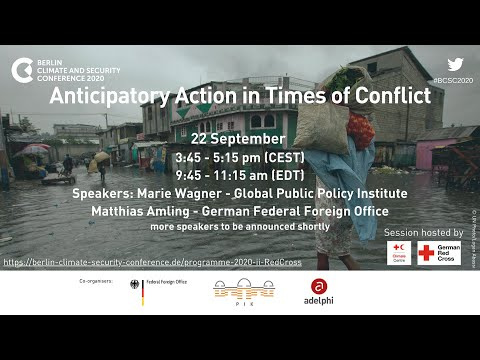BCSC II: Anticipatory action in times of conflict | DRK | 22.09.2020
Building on the high-level political Part I of BCSC 2020 and the launch of the Global Climate Security Risk and Foresight Assessment, Part II of the conference runs from September 7 to October 2. It brings together the climate-security community of practice and aims to inform policies and programming on the ground, including the Global Climate Security Risk and Foresight Assessment led by adelphi and the Potsdam Institute for Climate Impact Research (PIK).
The conference features a diverse and engaging programme of 22 partner-led online sessions, on themes selected to further the understanding of, and ability to address specific aspects of climate change and security which urgently need deeper exploration. Topics include how to better use data in climate security risk assessments, urban climate-security risks, integration of gender into responses to climate-security risks, and migration and displacement in the context of climate change and conflict. Events are hosted by adelphi, the Berghof Foundation, CCCPA, Chatham House, Clingendael, the European Peacebuilding Liaison Office, the German Red Cross, the International Development Law Organization, the IRC, the Munich Security Conference, PIK, the Red Cross Crescent Climate Centre, UNEP, and the UNSSC.
People affected by conflict are highly - and disproportionately - susceptible to climate- and weather-related hazards.
To address this, disaster risk reduction (DRR) is an essential part of the process to reduce these impacts. As part of these efforts, anticipatory approaches, in particular Forecast-based Financing (FbF), can help to protect people’s lives, livelihoods, and wellbeing in the face of foreseeable hazards. Based on risk analyses and forecasts, FbF provides the most vulnerable populations with assistance ahead of a (climate-related) disaster. These ‘anticipatory actions’ seek to cushion the impacts of a potentially harmful event. Yet, as it stands, most FbF programmes are happening in non-conflict settings. In this session, the Anticipation Hub engages participants in a dynamic discussion about the potentials and challenges to expand FbF to fragile, conflict-affected contexts.
Moderator
• Catalina Jaime, Senior Risk Adviser, Red Cross Red Crescent Climate Centre / University of Twente
• Liesa Sauerhammer, Manager for Disaster Risk Reduction in fragile contexts, German Red Cross
Speakers
• Marie Wagner, Research Associate, Global Public Policy Institute
• Matthias Amling, Desk Officer for Anticipatory Humanitarian Assistance - Division for Humanitarian Assistance – Policy, International Organisations, Multilateral Coordination, German Federal Foreign Office
• Alexandra Rüth, Head of the Anticipation Hub, German Red Cross










